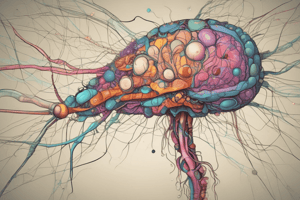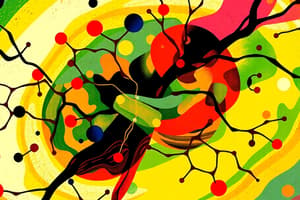Podcast
Questions and Answers
Which of the following is a type of hypertension characterized by a disorder of unknown origin affecting the Blood Pressure regulating mechanisms?
Which of the following is a type of hypertension characterized by a disorder of unknown origin affecting the Blood Pressure regulating mechanisms?
- Essential hypertension (correct)
- Obesity-related hypertension
- Secondary hypertension
- Stress-induced hypertension
Which of the following is responsible for intrarenal redistribution of pressure and increased absorption of salt and water in response to reduced renal pressure?
Which of the following is responsible for intrarenal redistribution of pressure and increased absorption of salt and water in response to reduced renal pressure?
- Sympathetic activity
- Angiotensin II production
- Renin production (correct)
- Aldosterone synthesis
What is the physiological equation for blood pressure?
What is the physiological equation for blood pressure?
- Blood Pressure = Heart rate + Stroke volume
- Blood Pressure = Arterial elasticity + Vascular resistance
- Blood Pressure = Blood volume / Heart rate
- Blood Pressure = Cardiac output X Resistance to passage of blood through precapillary arterioles (correct)
What is the primary effect of angiotensin II in regulating blood volume and blood pressure?
What is the primary effect of angiotensin II in regulating blood volume and blood pressure?
What is the long-term control mechanism for blood pressure by controlling blood volume?
What is the long-term control mechanism for blood pressure by controlling blood volume?
What is the mechanism of action of diuretics?
What is the mechanism of action of diuretics?
Which drug is a K+ sparing diuretic?
Which drug is a K+ sparing diuretic?
What is the main adverse effect of ACE inhibitors?
What is the main adverse effect of ACE inhibitors?
Which drug acts on central α2A receptors to decrease sympathetic outflow and lead to a fall in blood pressure?
Which drug acts on central α2A receptors to decrease sympathetic outflow and lead to a fall in blood pressure?
What is the MOA of calcium channel blockers?
What is the MOA of calcium channel blockers?
Which drug acts as a prodrug and is a precursor of dopamine and noradrenaline?
Which drug acts as a prodrug and is a precursor of dopamine and noradrenaline?
Which drug is an imidazoline derivative and a partial agonist of central alpha-2 receptor?
Which drug is an imidazoline derivative and a partial agonist of central alpha-2 receptor?
Which type of angina is due to obstruction of coronaries by atheroma?
Which type of angina is due to obstruction of coronaries by atheroma?
Which drug class blocks calcium entry in myocardium and vascular smooth muscles, causing a decrease in myocardium contractility & oxygen requirement?
Which drug class blocks calcium entry in myocardium and vascular smooth muscles, causing a decrease in myocardium contractility & oxygen requirement?
What is the biggest problem associated with antiarrhythmic drugs?
What is the biggest problem associated with antiarrhythmic drugs?
Which receptors do sympathomimetic agents activate to increase the force of myocardial contraction?
Which receptors do sympathomimetic agents activate to increase the force of myocardial contraction?
What is the initial drug of choice for treating mild heart failure?
What is the initial drug of choice for treating mild heart failure?
What is the effect of acute administration of β-blockers on myocardial contractility in heart failure?
What is the effect of acute administration of β-blockers on myocardial contractility in heart failure?
Which class of drugs reduces mortality in stable patients with heart failure when given with an ACE inhibitor and diuretic for approximately 1 year?
Which class of drugs reduces mortality in stable patients with heart failure when given with an ACE inhibitor and diuretic for approximately 1 year?
What is the main goal of reducing elevated plasma cholesterol level in the treatment of hyperlipidemia?
What is the main goal of reducing elevated plasma cholesterol level in the treatment of hyperlipidemia?
Which class of antiarrhythmic drugs causes strong Phase 0 depression with no effect on depolarization or action potential duration?
Which class of antiarrhythmic drugs causes strong Phase 0 depression with no effect on depolarization or action potential duration?
Which antiarrhythmic drug is an oral lidocaine derivative with similar activity to lidocaine?
Which antiarrhythmic drug is an oral lidocaine derivative with similar activity to lidocaine?
Which drug, developed initially to treat hypertension, suppresses ventricular fibrillation?
Which drug, developed initially to treat hypertension, suppresses ventricular fibrillation?
Which antiarrhythmic drug blocks Na+ channels mostly in ventricular cells and is also used as a local anesthetic?
Which antiarrhythmic drug blocks Na+ channels mostly in ventricular cells and is also used as a local anesthetic?
Which class of drugs is particularly indicated for patients with atrial fibrillation and increases the contractile force of the heart?
Which class of drugs is particularly indicated for patients with atrial fibrillation and increases the contractile force of the heart?
What is the primary mechanism of action of ACE inhibitors in the management of hypertension?
What is the primary mechanism of action of ACE inhibitors in the management of hypertension?
Which medication is a competitive antagonist and inverse agonist of AT1 receptors?
Which medication is a competitive antagonist and inverse agonist of AT1 receptors?
Why are cardioselective beta-blockers preferred over non-selective ones in certain patients?
Why are cardioselective beta-blockers preferred over non-selective ones in certain patients?
What is the primary effect of calcium channel blockers (CCBs) on the heart?
What is the primary effect of calcium channel blockers (CCBs) on the heart?
Which medication is often used for hypertensive emergencies and promotes hair growth in alopecia?
Which medication is often used for hypertensive emergencies and promotes hair growth in alopecia?
Flashcards are hidden until you start studying
Study Notes
- Rashes, urticaria, and certain medical conditions are contraindications for the use of ACE inhibitors and ARBs in hypertension management.
- ACE inhibitors are used to manage hypertension, congestive heart failure, myocardial infarction, and high CVS risk subjects. They work by inhibiting the conversion of angiotensin I to angiotensin II and thus blocking vasoconstriction and aldosterone release.
- ARBs, such as losartan, are competitive antagonists and inverse agonists of AT1 receptors. They block all the actions of angiotensin II without interfering with other receptors, except for TXA2.
- ARBs have fewer foetopathic effects compared to ACE inhibitors but can cause rare first-dose hypotension.
- Beta-blockers, both non-selective and cardioselective, are used to manage hypertension and reduce cardiac output. They work by blocking beta-adrenergic receptors and decreasing renin release from the kidney, NA release, and central sympathetic outflow.
- Cardioselective beta-blockers are preferred over non-selective ones due to fewer side effects in asthma, diabetes mellitus, peripheral vascular disease, and in young non-obese patients.
- Alpha-adrenergic blockers, particularly prazosin, are used to reduce total peripheral resistance and mean blood pressure, as well as venomotor tone and pooling of blood. They are not used as first-line agents in chronic essential hypertension.
- Calcium channel blockers (CCBs) block L-type calcium channels, leading to smooth muscle relaxation, negative chronotropic, ionotropic, and chronotropic effects in the heart, and diuretic action.
- Vasodilators, such as hydralazine and minoxidil, work by directly acting on the endothelium of arterioles, releasing NO, and relaxing vascular smooth muscle. Hydralazine is often used for hypertensive emergencies and promotes hair growth in alopecia. Sodium nitroprusside is a rapidly acting vasodilator used for hypertensive emergencies and infused with caution due to its cyanide release.
Studying That Suits You
Use AI to generate personalized quizzes and flashcards to suit your learning preferences.




